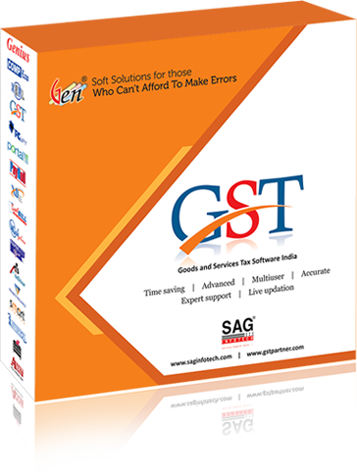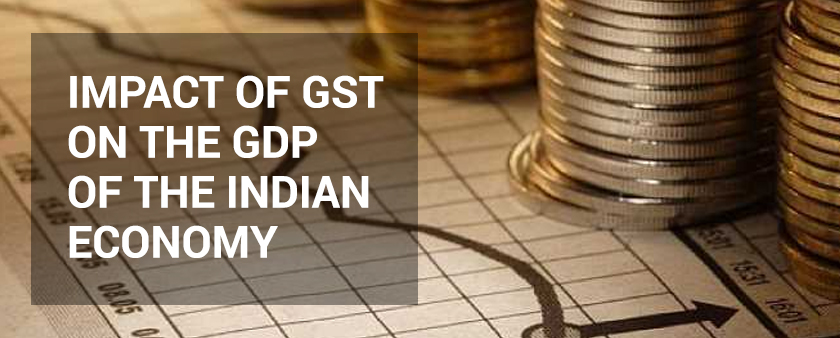GST has been implemented from the 1st July, and there is a lot of ‘if and buts’ going on related to its effects on the Indian economy and finally on the GDP of the country. The sole motto of the GST is to eliminate the cascading tax structure prevailing in the country and to bring about a qualitative change in the tax system by redistributing the burden of taxation equitably between manufacturing and services.
As we all know that the GST stands for Goods and Services Tax, which will be imposed on sale, manufacturing, and usage of goods and services and is designed to replace the indirect taxes imposed on goods and services by the Centre and States. The GST is aimed to replace the plethora of cascading center, state, interstate and local taxes with a single, nationwide, value-added tax on goods and services.
Impact of GST on Indian Economy/GDP
Though, the exact impact of GST on the GDP can be best analyzed only after the implementation of the law. However, on the basis of expert views, it will be beneficial for the Indian economy on multiple counts which are discussed below. Below, both the expected positive and negative impact of the GST law after implementation has been briefly described.
Positive and Negative GST Effects on Indian GDP:
- The GST will reshape the indirect tax structure by dissolving majority of indirect taxes like excise, sales and services levies prevailing in the country. This will definitely do away with the complex indirect tax structure of the country, hence will improve the ease of doing business in the country.
- According to the International Monetary Fund, the adoption of the Goods and Service Tax (GST) could help raise India’s medium-term gross domestics product (GDP) growth to over 8 percent and create a single national market for enhancing the efficiency of the movement of goods and services.
- Exports will become competitive as the GST regime will eliminate the cascading impact of taxes. The National Council of Applied Economic Research study has suggested that GST could boost India’s GPP growth by 0.9-1.7 per cent. As per the trade body Assocham president Sunil Kanoria, GST is a masterstroke for India’s gross domestic product in times of challenging global environment.
- As GST is intended to create a unified market, which would facilitate seamless movement of goods across states and will ultimately reduce the transaction cost of businesses. A UBS Securities study has found that truck drivers in India spend 60 percent of their time off roads negotiating check posts and toll plazas. The foreign brokerage said that at the moment 11 categories of taxes are levied on the road transport sector, the implementation of GST will bring down all these, which will finally help bring down logistical costs.
- Under the GST, manufacturers will get credits for all expenses paid before in the goods/services chain, thus boosting firms to source inputs from other enlisted dealers. This could bring extra revenue to the government as the unorganized sector, which is currently not a part of the value chain, would be drawn into the taxation system.
- To claim input tax credit under GST, every dealer has an impetus to demand documentation from the dealer behind him in the esteemed tax chain. Thus this new taxation system will be less intrusive, more self-policing, and thus a more successful method for diminishing corruption.
- The supplier, because of the paper trail left by the GST, knows that his/her evasion will be more likely to be detected once his/her client is audited. And in the light of this point, many economic experts are of the opinion that the GST will improve overall tax compliance.
- As per the reports of the Finance Ministry, the GST regime will boost the ‘Make In India’ initiative as manufacturers will get input tax credits for capital goods.
- The Confederation Of Indian Industry (CII) has estimated that the rise in 1 per cent of GDP will lead to the creation of 25 lakhs new jobs. And after the implementation of the GST, the estimated GDP growth will be about 2-2.5 percent, hence paving the way to create at least 50 lakhs new jobs in the country.
- The implementation of the GST in the Indian tax collection framework will lessen the number of excise duty exemptions. As indicated by the central government’s estimates, excise tax exemptions result in loss of Rs. 1.8 lakh crore, whereas, the figure for the states is about Rs. 1.5 lakh crore. Altogether, India loses around 2.7 percent of GDP because of exemptions, and this will end once the GST becomes effective from the 1st July.
- Most of the goods and services have been listed under the four broad tax slabs – 5 per cent, 12 per cent, 18 per cent and 28 per cent and in most of the cases it is up from the current level of 15 percent. This increased tax slab has led to fears that inflation could rise in the short term.
- There is no doubt that the current structure of the GST is expected to lead a temporary rise in inflation, but be assured that it will typically last for a year. Because the inflation in the second year after GST implementation will benefit favorably as the numbers would be compared to already-high figures of the first year of implantation.
Read More Blogs on Impact of GST in India
- How GST Will Impact the Lives of Common Man
- Impact of Goods and Service Tax on Indian IT Sector
- Impact of GST on State Government Revenues in India
It’s worth mentioning, that for GST to be successful in the federal structure of the country, all states and the Centre should implement it in a similar fashion. Then only GST will bring about the concept of a national common market.
A flawless GST and the New Direct Taxes Code will put India’s fiscal system on the cutting edge of the world market economies and even a 2 percent reduction in costs increases profits by over 20 per cent, which will attract investments.
As tax cascading disappears, the industry will move to the lagging regions because of lower costs and thus bring these into the growth dynamics, ultimately leading to the growth in the economic structure of the nation. All in all, we can say that the GST is undoubtedly the biggest economic reform since 1991-92.







One Reply to “Impact Of GST On The GDP Of The Indian Economy”